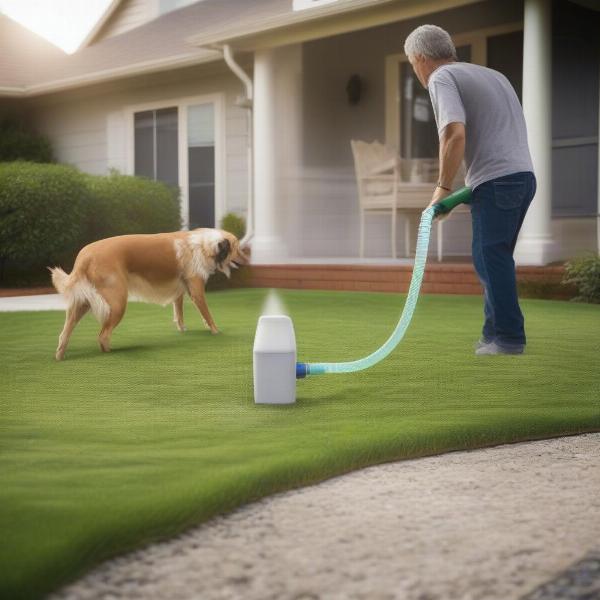Growing a lush, green lawn can feel like a constant battle when you have dogs. Their playful paws, zoomies, and, let’s be honest, potty breaks can wreak havoc on even the most resilient turf. But don’t despair! Achieving that picture-perfect lawn while keeping your furry friends happy is absolutely possible. This guide will provide you with expert tips and practical advice on how to grow a lawn with dogs, covering everything from choosing the right grass seed to repairing dog-damaged areas.
Choosing the Right Grass Seed
The foundation of a dog-friendly lawn starts with selecting the right grass seed. Opt for durable varieties that can withstand heavy foot traffic and recover quickly from wear and tear. Some excellent choices include tall fescue, Kentucky bluegrass, and perennial ryegrass. These grasses are known for their resilience and ability to withstand the rigors of an active dog.
Consider your local climate and soil conditions when choosing the best grass seed. For example, if you live in a warmer climate, Bermuda grass or Zoysia grass might be suitable options. Consult with your local garden center for personalized recommendations based on your specific needs.
Addressing Dog Urine Spots
One of the biggest challenges of maintaining a lawn with dogs is dealing with those unsightly brown spots caused by dog urine. The high nitrogen content in dog urine can burn the grass, leaving behind dead patches.
One effective solution is to train your dog to urinate in a designated area, perhaps a patch of gravel or mulch. If this isn’t feasible, dilute the urine by immediately flushing the area with water after your dog has finished. You can also consider using a dog-specific lawn repair treatment containing enzymes that break down the nitrogen in urine.
 Handling Dog Urine Spots on the Lawn
Handling Dog Urine Spots on the Lawn
Repairing Damaged Areas
Even with the most durable grass, some damage is inevitable. Regular play, digging, and running can create bare patches and divots. To repair these areas, loosen the soil with a rake, add some fresh topsoil, and reseed with the same grass seed you used originally. Water the area regularly to encourage germination and growth.
Watering and Fertilizing
Proper watering and fertilizing are essential for a healthy lawn, especially one that has to endure the wear and tear of dogs. Water deeply and less frequently to encourage strong root growth. A slow-release fertilizer is recommended as it provides a steady supply of nutrients without burning the grass. Avoid over-fertilizing, as this can actually weaken the grass and make it more susceptible to damage.
Dog-Friendly Lawn Care Practices
Opt for organic lawn care products whenever possible to minimize the risk to your pets. Avoid using chemical herbicides and pesticides, as these can be harmful to dogs if ingested. Instead, consider natural alternatives like corn gluten meal or vinegar solutions.
Conclusion
Maintaining a beautiful lawn with dogs requires a bit of extra effort, but it’s certainly achievable. By choosing the right grass, addressing urine spots promptly, and implementing dog-friendly lawn care practices, you can enjoy a lush green space that both you and your furry friends will love. Remember, patience and consistent care are key to success!
FAQ
- What is the best grass type for dogs? Durable varieties like tall fescue, Kentucky bluegrass, and perennial ryegrass are good choices.
- How do I prevent dog urine spots? Train your dog to use a designated area or dilute urine spots with water immediately.
- What can I do to repair damaged areas? Loosen the soil, add topsoil, and reseed with the same grass seed.
- Are there dog-friendly lawn care products? Yes, opt for organic products and avoid chemical herbicides and pesticides.
- How often should I water my lawn? Water deeply and less frequently to encourage strong root growth.
ILM Dog is your go-to resource for expert advice on all aspects of dog care, from breed selection and puppy care to senior dog health and training. We’re dedicated to providing practical, reliable information to help you provide the best possible care for your canine companion. For personalized advice and further assistance, contact us at [email protected] or +44 20-3965-8624. Visit ILM Dog for more helpful tips and resources.